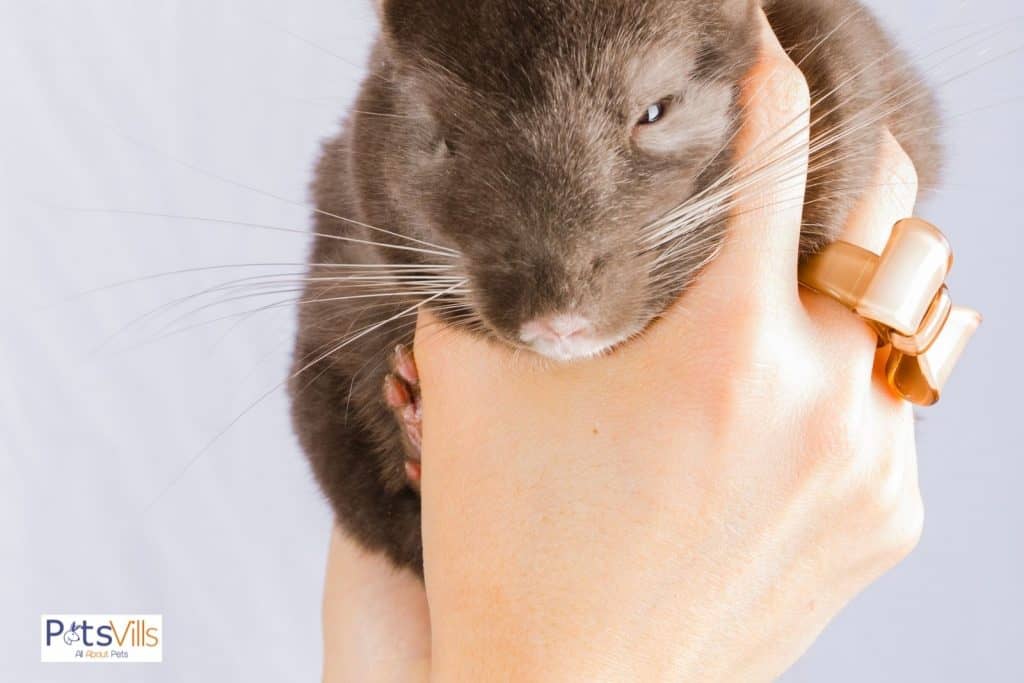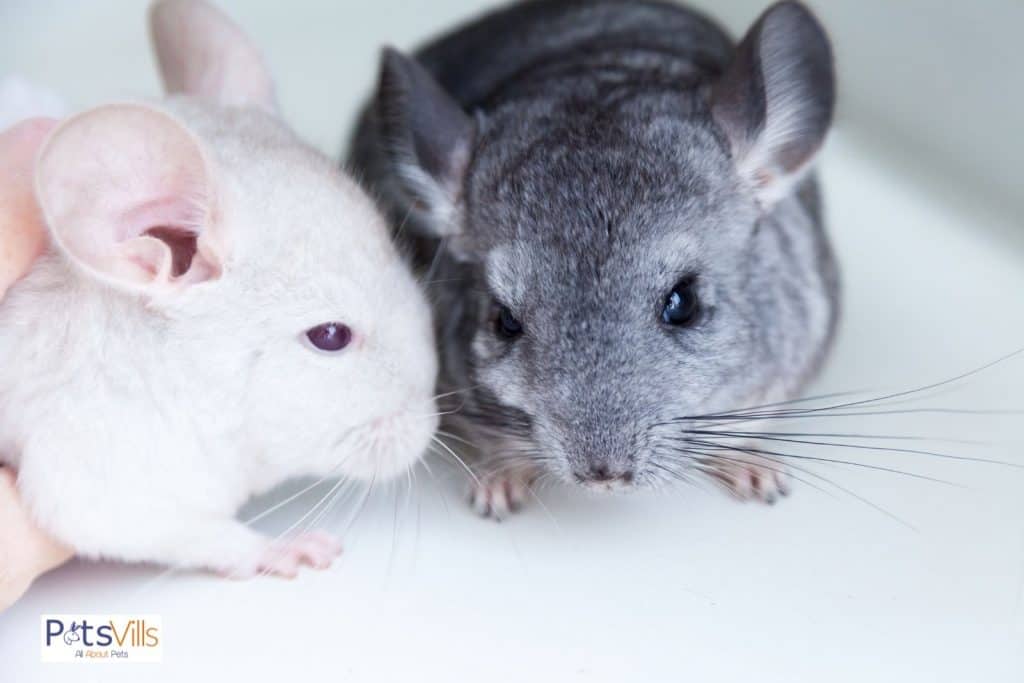Humans use different words, tones, pitches, and sounds to communicate. Animals do the same, although their mode of communication is entirely different from human beings.
Why do chinchillas bark? Chinchilla’s bark when they are frightened and warn other chinchillas of the danger. It is used to communicate. If something is bothering them, they are likely to bark.
Chinchillas, just like other animals, use barking and different types of chinchilla sounds to communicate. This article will discuss why chinchillas bark and how to stop their barking.
Table of Contents
Why Do Chinchillas Bark?
 Chinchilla’s bark [1] for a few reasons.
Chinchilla’s bark [1] for a few reasons.
Usually, it is to show that they are:
- Distressed or frightened
- Have been injured and are in pain
- Changes to their environment
- feeling grumpy
When chinchillas are threatened, they bark to warn other chinchillas of possible dangers.
This is a natural behavior that chinchillas have retained for centuries.
The main reason they bark is that they have been alarmed by something. For example, if you shout or slam a door. They are likely to bark.
Chinchillas will also bark in severe pain, although this kind of barking is different from the warning bark.
If they are ill or hurt and you try to carry them. Chinchillas [2] may bark to let you know you are hurting them.
Barking can also be used to draw attention. The chinchilla may bark to get your attention.
Chinchillas have also been known to bark when they’re feeling grumpy.
READ MORE: Where Do Chinchillas Come From?
Find out why chinchillas bite their cage in this short video:
How Do You Stop Chinchillas From Barking?
 Your chinchilla will bark when there’s something wrong.
Your chinchilla will bark when there’s something wrong.
To stop them from barking, you should find out what’s bothering them and remove that from their environment.
For example, some chinchillas may bark when there are other animals around. Remove the other animal from their environment, and they should stop.
Avoid putting the chinchillas in a situation where they are stressed or alarmed.
If noises in the house make the bark, try to keep things quieter.
If you think the cause of the barking is distress or pain, you might want to take your chinchilla to the vet for a check-up.
READ MORE: What Temperature Can Chinchillas Live in?
Should You Give Chinchillas Space When They Start to Bark?
Like other animals, if they are ill or in a bad mood, they are likely to bark and snap.
If this happens, it is better to withdraw and give them some space.
Before giving them some space, you need to ensure they haven’t hurt themselves.
Check for any visible signs of injuries, such as blood or swelling.
Examine their nose, eyes, and mouth for moisture and mucus as they could be sick.

Environmental changes can also stress them out [3]. Maybe you have moved their play area, cage, or changed routine?
It would be best to give them time to adapt to the change. The chinchilla will bark for some time to show their discontent.
Like human beings, chinchillas have bad days and moods, and sometimes what they need is their own space. If this is the case, just let them be. It won’t be long until they are back to normal.
Should You Be Wary of Chinchillas That Bark at Each Other?
Once your chinchilla starts to bark at one another, a fight is likely to occur, and one or both chinchillas may be injured.
Some chinchillas are very territorial.
It is better to take caution and keep the chinchillas apart.
Sometimes hormonal fluctuation in female chinchillas can make them attack the males. (significantly younger males).
She may bark, spray urine on him and bite his fur.
You want to separate them immediately to prevent injury or death if this happens.
If a pair of chinchillas show affection towards each other, you can house them together. If they seem to have a conflict, separate them and try introducing them to each other later after they have cooled off.
Once they are back in the same cage, monitor their behaviors around each other and be ready to separate them if it continues.
Take a look at this video.
What Other Sounds Do Chinchillas Make Other Than Barking?
Besides barking, chinchillas make other sounds to express different feelings to the owner and other chinchillas. So, make sure you check out the following chinchilla vocalizations and act accordingly:
Coo
Chinchilla’s coo when they are in a happy mood. Chinchillas will make this sound when they communicate or greet other chinchillas or see you come toward their cage.
As you get to know your chinchilla, you will start to realize that this sound means they are happy. Another instance where chinchillas will make this sound is when they know it’s time to get out of the cage and play.
Cry
If you take care of your chinchillas and ensure they are protected well, it is hard for them to cry. However, things happen, and if they get hurt or their tails are stepped on, they may be in pain.
Teeth Chattering
Chinchilla’s chatter for different reasons. Chinchillas may chatter if they are anxious or in pain. In certain instances, chinchillas will chatter to indicate they are happy.
Take a look at this video to learn about other common chinchilla sounds.
Do Baby Chinchillas Bark?
Baby chinchillas bark differently from adult chinchillas.
They squeak in a loud and high pitch. Often to get the attention of their mother. When they do this, they want to be cared for or are hungry.
The mother chinchillas usually respond by grunting and licking the baby chinchilla carefully.
The baby chinchillas will often crawl under their mother’s underside looking for teats.
At the same time, the mother will turn them upside down and lick them with her tongue.
Baby chinchillas are more aggressive and talkative than adult chinchillas.
Making noises when sleeping
Chinchillas do not necessarily bark when they are asleep.
However, they tend to make a small amount of noise when dreaming.
Concerns
It would be best if you noted your pet’s vocalizations and how they behave when making different noises.
Once you identify the kind of noise your chinchillas make, you will know what they need.
Do not be disturbed if your chinchillas don’t make any sounds, as this could mean they are happy with their environment, and they do not see any need to cause alarm.
If your chinchilla starts to make a lot of noises and behave weirdly, you may want to take them to the vet.
Do Chinchillas Bark to Prove Dominance?
Some chinchillas will want to be more dominant over the chinchilla they share the cage with.
They have several ways of doing things. They might bark, pull up hair, hump, size each other, fight, bite, and spray urine to figure out their pecking order.
If your chinchillas start to bark at each other, you should separate them immediately as they can become aggressive.
There have been times when chinchillas will fight each other to the death.
You know when it’s time to separate them when they become furious and start chasing each other around the cage.

To reduce and prevent injury or death, you should adequately introduce each chinchilla.
When introducing a new chinchilla to each other, you should keep a close eye on them to ensure they don’t show any signs of aggression.
You may want to keep an extra cage stand by just in case.
Watch out for the following signs: biting, chasing, hair pulling, and fighting.
Bullying is another way for chinchillas to portray dominance. When a chinchilla bullies others, it will stop the other from drinking, eating, or using things such as the cage or the wheels.
Bullying is not as severe as fighting. Nevertheless, it is still stressful. The victim usually sits in the corner of the pen, away from the bully.
The bullied chinchilla can quickly lose weight and be terrorized.
You should provide each chinchilla with its water bottles, food dishes, and accommodation in this situation.
If the victim stills appear to be stressed, shaking, not drinking or eating, cowering in the corner of the cage, and losing weight, you must separate the chins as soon as possible.
FAQs
How do chinchillas communicate when they bark?
They use different vocal sounds to express mixed feelings. Chinchillas may indicate comfort and playful mood or signal danger or location information when barking. Chinchillas also communicate through olfactory cues and body language.
Why is my chinchilla making a weird noise?

When chinchillas are introduced to a new environment, they can make weird noises or be frightened or scared.
Do chinchillas make noise when they sleep?
Chinchillas will make a small amount of noise when they are sleeping. They also tend to move a lot. While asleep, chinchillas can quickly wake up if they hear any noise.

What sounds do your chinchillas make other than bark? Please let us know in the comments.
Resources
- 1. Hunyady H, Scherer R, Cooper D, Dilley L. VOCAL SOUNDS OF THE CHINCHILLA Committee [Internet]. 2008. Available from: https://etd.ohiolink.edu/apexprod/rws_etd/send_file/send?accession=bgsu1206318183&disposition=inline
- 2. Chinchilla lanigera – an overview | ScienceDirect Topics [Internet]. www.sciencedirect.com. [cited 2022 Feb 18]. Available from: https://www.sciencedirect.com/topics/agricultural-and-biological-sciences/chinchilla-lanigera
- 3. Moreno-Gómez FN, León A, Velásquez NA, Penna M, Delano PH. Individual and sex distinctiveness in bark calls of domestic chinchillas elicited in a distress context. The Journal of the Acoustical Society of America. 2015;138:1614–22.
Alina Hartley is a small-town girl with a ginormous love of bearded dragons. It all started with Winchester, a baby bearded who was abandoned at the shelter by his former owners because of a birth defect that caused one front leg to be shorter than the other. Alina originally went to the shelter looking for a guinea pig, but one look at Winchester and it was love at first sight. From that day on, Alina has dedicated her life to learning everything she can about bearded dragons. She loves helping new beardie parents start their incredible journey with these magnificent reptiles.
Follow her on:
LINKEDIN
TWITTER.
Read her latest articles HERE
Learn more about her HERE.


